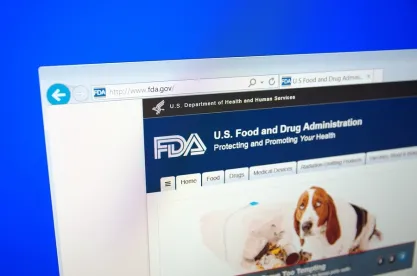Key Takeaways:
What Happened: FDA updated its temporary hand sanitizer production policies to permit use of fuel- or technical-grade ethanol that contains certain impurities up to given limits.
Who’s Impacted: Manufacturers of fuel- and technical-grade ethanol and producers of alcohol-based hand sanitizer products during the COVID-19 pandemic.
What Should They Consider Doing in Response: Ensure that ethanol manufactured, distributed, or procured for use in hand sanitizer products meets the standards defined in FDA’s updated temporary policies.
The U.S. Food and Drug Administration (FDA) on June 1 updated its temporary hand sanitizer policies with the stated aim of helping to ensure a sufficient supply of ethanol for use in hand sanitizer products that does not include harmful levels of impurities. Specifically, FDA will temporarily permit the use in hand sanitizer products of fuel- or technical-grade ethanol that contains certain impurities, as long as those impurities do not exceed given limits.
FDA’s updated policies are effective immediately. They will remain in effect for the duration of the public health emergency announced by the Department of Health and Human Services on January 31, after which FDA intends to withdraw the temporary policies. FDA’s action complements similar steps it has taken separately to facilitate the manufacture and availability of medical devices intended for use against the novel coronavirus.
1. FDA’s Temporary Enforcement Discretion Policies for Alcohol-Based Hand Sanitizers
During the pandemic, FDA is not enforcing some of its requirements for certain aqueous solution hand sanitizers that contain ethanol or isopropyl alcohol as active ingredients. These products must meet specific formulation and production criteria established under FDA’s temporary policies for the manufacturing of alcohol for, and the compounding and preparation of, alcohol-based hand sanitizer products. For example, formulas must be consistent with World Health Organization (WHO) recommendations. Any ethanol in these products must also be denatured consistent with Alcohol and Tobacco Tax and Trade Bureau (TTB) requirements. The FDA guidance explains, “Denaturing is critical because there have been reports of adverse events, including deaths, from ingestion of hand sanitizer. Most reports are for unintentional ingestion in young children.” Such products must be produced at FDA-registered facilities and be labeled consistent with FDA-prescribed requirements. Other requirements also apply.
Ethanol used in such products must generally be tested for impurities and meet United States Pharmacopeia (USP) or Food Chemical Codex (FCC) grade requirements. However, some fuel ethanol products may contain carcinogenic chemicals such as gasoline, benzene, and acetaldehyde. Although these impurities are not expected from typical ethanol fermentation and distillation processes, they may be present when manufacturing fuel- or technical-grade ethanol. Ethanol containing these impurities does not meet USP or FCC grade requirements.
2. Temporarily Permitting Certain Impurities in Fuel-Grade Ethanol Used in Hand Sanitizers
The latest update to FDA’s temporary hand sanitizer manufacturing, compounding, and preparation policies allows for the use of fuel- or technical-grade ethanol that includes some of the reported impurities, as long as those impurities do not exceed specified concentrations. FDA states that it has determined that these impurities “can be tolerated for a relatively short period of time.”
Thus, for the duration of the COVID-19 pandemic, fuel grade ethanol may now be compounded into hand sanitizer under the temporary policies as long as:
-
It contains no gasoline or any gasoline components (e.g., n-heptane);
-
Impurities meet the newly established interim limits for methanol, benzene, acetaldehyde, and acetal (1,1-diethoxyethane) and no other potentially harmful impurities are present;
-
If the sum of all other impurities (such as acetone, n-propanol, and ethyl acetate) exceeds FDA’s interim limit of 300 ppm, they must be individually identified and remain within specific limitations established for each such impurity; and
-
If the ethanol contains any impurity not listed by FDA, the entity wishing to use it must submit data specifying the level for each individual impurity and information regarding the safety of each impurity, if available, for FDA’s assessment.






 />i
/>i
